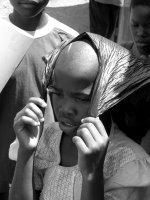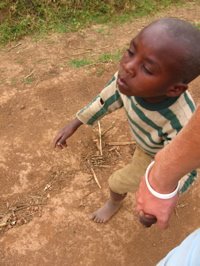The Millennium Villages are based on a single powerful idea: impoverished villages can transform themselves and meet the Millennium Development Goals by 2015 if they are empowered with proven, powerful, practical technologies. It is simply a "bottom up" approach to lifting villages in developing countries out of the poverty trap that confines more than one billion people worldwide.
Please see www.millenniumpromise.org for more information.
Sunday, March 26, 2006
Tuesday, March 14, 2006
Question of the Week
Monday, March 13, 2006
Globe and Mail Article
Exerpt from "Millenium Man", The Globe and Mail, Saturday March 11
But Prof. Sachs said the real onus is on donor countries. He heaps scorn on Canada, for the failure to meet 0.7, and on the Group of Eight industrial countries in general, which he said outright lie about their commitments to ending poverty, making huge pledges at summits and refusing to pony up any of the money.
...
"There's no such thing as a culture that doesn't care about their children and want them to be healthy. The idea that somehow the poor have themselves to blame and there's nothing we can do. . . . We got on the wrong track actually, and we never understood that there were things we could do with a little confidence in each other."
There is something that we can do as Canadians; Lead the way to 0.7%, with a 'little confidence' that our government will do the same.
For the full article please read:
http://www.theglobeandmail.com/servlet/story/RTGAM.20060311.wxnolen0311/BNStory/Front/home
But Prof. Sachs said the real onus is on donor countries. He heaps scorn on Canada, for the failure to meet 0.7, and on the Group of Eight industrial countries in general, which he said outright lie about their commitments to ending poverty, making huge pledges at summits and refusing to pony up any of the money.
...
"There's no such thing as a culture that doesn't care about their children and want them to be healthy. The idea that somehow the poor have themselves to blame and there's nothing we can do. . . . We got on the wrong track actually, and we never understood that there were things we could do with a little confidence in each other."
There is something that we can do as Canadians; Lead the way to 0.7%, with a 'little confidence' that our government will do the same.
For the full article please read:
http://www.theglobeandmail.com/servlet/story/RTGAM.20060311.wxnolen0311/BNStory/Front/home
Thursday, March 09, 2006
Thought of the week.
This campaign is a conversation. A conversation between Canadians, a conversation between Canadians and our government, a conversation between “our world” and “their world”, and most importantly, a conversation between our children’s world and their children’s world. It is cliché to say that we are only as strong as our weakest link but many would argue that this holds true of humanity and of our planet, and the respective future of each. It is both bull-headed and blinded to think that we any longer live in an insular world. What happens in Timbuktu can and will affect us where we are. If the disparity within humanity continues, or worse, continues to grow, what impact will that have on our future? Do you think you are immune? Who is to say that if left impoverished and weakened, this world will not serve as an easy breeding ground for the next pandemic; a fertile petrie dish for the demise of humanity?
And let’s not forget the ultimate question; are we not all human? Do we all not share the most basic right for existence and the opportunity for survival? Please join us and let’s help Make Poverty History. We are all in this together.
And let’s not forget the ultimate question; are we not all human? Do we all not share the most basic right for existence and the opportunity for survival? Please join us and let’s help Make Poverty History. We are all in this together.

This girl attended an informal school where I volunteered, which serviced the HIV/AIDs affected community in one of the biggest slums in Kampala, Uganda. She attends this informal school because her parents or guardians cannot afford to pay for the school fees for a proper elementary school, about $10 US/month.
~Paul
So it begins....
"When the end of poverty arrives, as it can and should in our own generation, it will be citizens in a million communities in rich and poor countries alike, rather than a handful of political leaders, who will have turned the tide." - Jeffrey D. Sachs, The End of Poverty
Subscribe to:
Posts (Atom)

